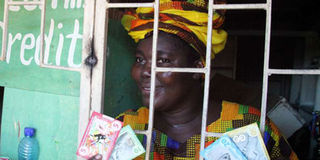Mombasa County commissioner opposes use of community currency

Emma Onyango, the Bangla-Pesa grassroots coordinator, displays the various notes of the currency at her shop in Bangladesh, Mombasa, on May 10, 2017. She said Bangla-Pesa has helped the community pay for goods and services. PHOTO | LABAN WALLOGA | NATION MEDIA GROUP
What you need to know:
- County commissioner Evans Achoki said Bangla-Pesa is not the official medium of exchange.
- Bangla-Pesa is a unit of credit that provides a means of payment that is complementary to official money.
The Mombasa County commissioner wants the use of the alternative currency known as Bangla-Pesa stopped.
County commissioner Evans Achoki said Bangla-Pesa is not the official medium of exchange.
"It is just barter trade and it should be discouraged. We are in the 21st century.
"How can people still engage in what was done centuries ago? It is inappropriate," Mr Achoki said.
BOOST ECONOMY
Residents of Bangladesh, the largest slum in the county, have been using Bangla-Pesa as a complementary currency.
According to the Grassroots Economics website, Bangla-Pesa is a unit of credit that provides a means of payment that is complementary to official money.
As such, it helps to stabilize the community in the face of monetary volatility by allowing members of it network to trade with each other without using the national currency.
Launched in 2013, it is a non-profit initiative meant to bolster the economy of the informal settlements by organising small-scale enterprises into business networks, through which members can utilize a community currency to mediate trades.
BARTER TRADE
The residents have been using the currency printed in Germany to pay school fees, funeral expenses, and as church offering, among other uses.
Credits are issued in the form of paper vouchers as payment for goods and services.
The vouchers merely represent the goods and services of the business network, and come in denomination notes of five, 10, 20, 40 and 50.
A member is given a maximum of 400 Bangla-Pesa, of which 200 goes back to the community and is used in cleaning up the area.
Poisa Mwandawiro, an economist, has advised the users to push the government to accept it as an avenue for trading.
The initiative enables registered members to engage in barter trade with each other.
"According to the national status, we normally have a unified currency that is used to create equilibrium in exchange of goods and services.
"As an economist, I would advise them to enforce it more and more for its recognition and involve the National Treasury and the Central Bank of Kenya.
"It unifies people. Bangla-Pesa is a good concept if it [is] used as a promissory note whereas you can buy goods and services and pay later," Mr Mwandawiro said by phone.
ARRESTED
Members of the Bangladesh Business Network, led by the national chairman Paul Mwania, said the business will continue.
"It is a business-to-business voucher system that provides a means of payment that is complementary to the Kenyan official money as the economy is dwindling.
"People don’t understand this model. They should come and learn from us," he said.
Mr Mwania said that in 2013, six members, including inventor Will Ruddick, were arrested and charged with possession of illegal currency papers, because they were thought to be a secessionist group like the Mombasa Republican Council.
They were later released and the charges dropped.
Mr Mwania, who runs a butcher shop, trades meat for water from Emma Onyango.
He said the goods exchanged should be of the same value.
GROWING MEMBERSHIP
For example, he can get 10 jerry cans of water from Ms Onyango at Sh100 and she can get meat of the same value.
The network consists of people who run different businesses.
Ms Onyango, the grassroots coordinator, was among the six who were arrested.
"We started with around 100 members but we have grown to 2,000 and more want to join," she said.
The group also uses Kenyan currency to buy stock.
The Bangladesh Business Network now wants to meet President Uhuru Kenyatta and Central Bank of Kenya Governor Patrick Njoroge to "enlighten" them about the currency and forge better relations.
Foreign tourists and university students are also flocking to the slum to conduct research about the currency and how locals’ lives have changed, added Ms Onyango.





